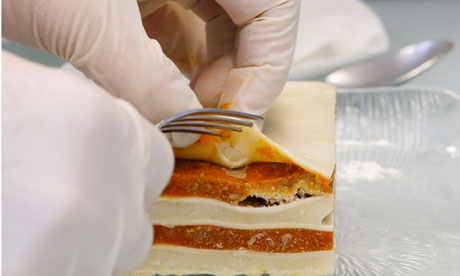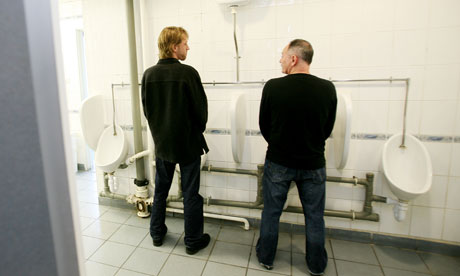This is a crisis not only for environment secretary, Owen Paterson, but for the whole Conservative party

A laboratory worker tests beef lasagne. Photograph: Pascal Lauener/Reuters
The collapse of a belief system paralyses and terrifies in equal measure. Certainties are exploded. A reliable compass for action suddenly becomes inoperable. Everything you once thought solid vaporises.
Owen Paterson, secretary of state for the environment, food and rural affairs, is living through such a nightmare and is utterly lost. All his once confident beliefs are being shredded. As the horsemeat saga unfolds, it becomes more obvious by the day that those Thatcherite verities – that the market is unalloyed magic, that business must always be unshackled from "wealth-destroying" regulation, that the state must be shrunk, that the EU is a needless collectivist project from which Britain must urgently declare independence – are wrong.
Indeed, to save his career and his party's sinking reputation, he has to reverse his position on every one. The only question is whether he is sufficiently adroit to make the change.
Paterson is one of the Tories who joyfully shared the scorched earth months of the summer of 2010 when war was declared on quangos and the bloated, as they saw it, "Brownian" state. The Food Standards Agency was a natural candidate for dismemberment. Of course an integrated agency inspecting, advising and enforcing food safety and hygiene should be broken up. As an effective regulator, it was disliked by "wealth-generating" supermarkets and food companies. Its 1,700 inspectors were agents of the state terrifying honest-to-God entrepreneurs with unannounced spot checks and enforced "gold-plated" food labelling. Regulation should be "light touch".
No Tory would say that now, not even Paterson, one of the less sharp knives in the political drawer. He runs the ministry that took over the FSA's inspecting function at the same time as it was reeling from massive budget cuts, which he also joyfully cheered on. He finds himself with no answer to the charge that his hollowed-out department, a gutted FSA with 800 fewer inspectors and eviscerated local government were and are incapable of ensuring public health.
Paterson, beneath the ideological bluster, is as innocent about business as Bambi. Even the most callow observer could predict that with the wholesale slaughter of horses across the continent as recession hit the racing industry – horsemeat production jumped by 52% in 2012 – some was bound to enter the pan-European network of abattoirs, just-in-time buying, industrial refrigeration units, food brokers and giant supermarkets that deliver British and European consumers their food.
Meanwhile, the budgets of some local government food sampling units have been slashed by 70%. A Tesco beef burger containing 29% horsemeat was an accident waiting to happen. Of course it was the Food Safety Authority of Ireland rather than the FSA that blew the whistle. Businesses owned by footloose "tourist" shareholders whose sole purpose is profit maximisation in transactional markets have an embedded propensity to degrade. Consumers and suppliers alike become no more than anonymised numbers to be exploited to hit the next quarter's profit target.
The large supermarkets have said little or nothing, which Number 10 deplores. There is nothing they can say. They have lobbied for the world in which we now live. An alternative world – in which consumers were genuinely served and where it is understood that suppliers need adequate profit margins in the supermarkets' interests as much as the suppliers' own – has to be created by stakeholders, including by government. There is a codependency between state, society, business and business supply chains, anathema to Paterson with his undeviating obeisance to the virtues of a "private sector" free from such "burdens".
What the Paterson worldview has never understood is that effective regulation is a source of competitive advantage. If Britain had a tough Food Standards Agency, it would become a gold standard for food quality, labelling and hygiene. British supermarkets and food companies could become known for their quality at home and abroad, rather as "over-regulated" German car companies are, rather than first suspects when something dodgy is going on. Capitalism does not organise itself to deliver best outcomes, whatever rightwing American thinktanks might claim. There has to be careful thought, law and regulation about the obligations that accompany incorporation and ownership, how supply chains are organised and how companies are managed and financed. Otherwise disaster awaits.
And there are other bitter implications for Paterson. Geography means that Britain is inevitably part of the European food supply chain. Our efforts at better regulation – and of catching wrongdoers – have to be matched by others for everyone's sake, exactly what the EU was set up to do and is now doing. The hypocrisy of passionate Eurosceptic Owen Paterson flying to the Hague urgently to meet Europol, saying afterwards: "It's increasingly clear the case reaches right across Europe. Europol is the right organisation to co-ordinate efforts to uncover all wrongdoing and bring criminals to justice" and urging all European governments to share information with it, should not be lost on anyone. Europol holds powers from which Eurosceptic Tories, led by Paterson, urgently want an opt-out, but not in the middle of a first-order food safety and hygiene crisis.
That everything Paterson believes in is so wrong is not just a crisis for him – it is a crisis for his party and for Britain's centre-right media whose prejudices makes thinking straight in the Tory party impossible. A great country cannot be governed by politicians whose instincts and policies are at such odds with reality, so betraying the people, economy and society they govern. The horsemeat crisis is not confined to our food chain. It reveals the existential crisis in contemporary Conservatism. British democracy needs a functioning, fit for purpose party of the centre-right.
Instead, it has Owen Paterson and today's Tories.


